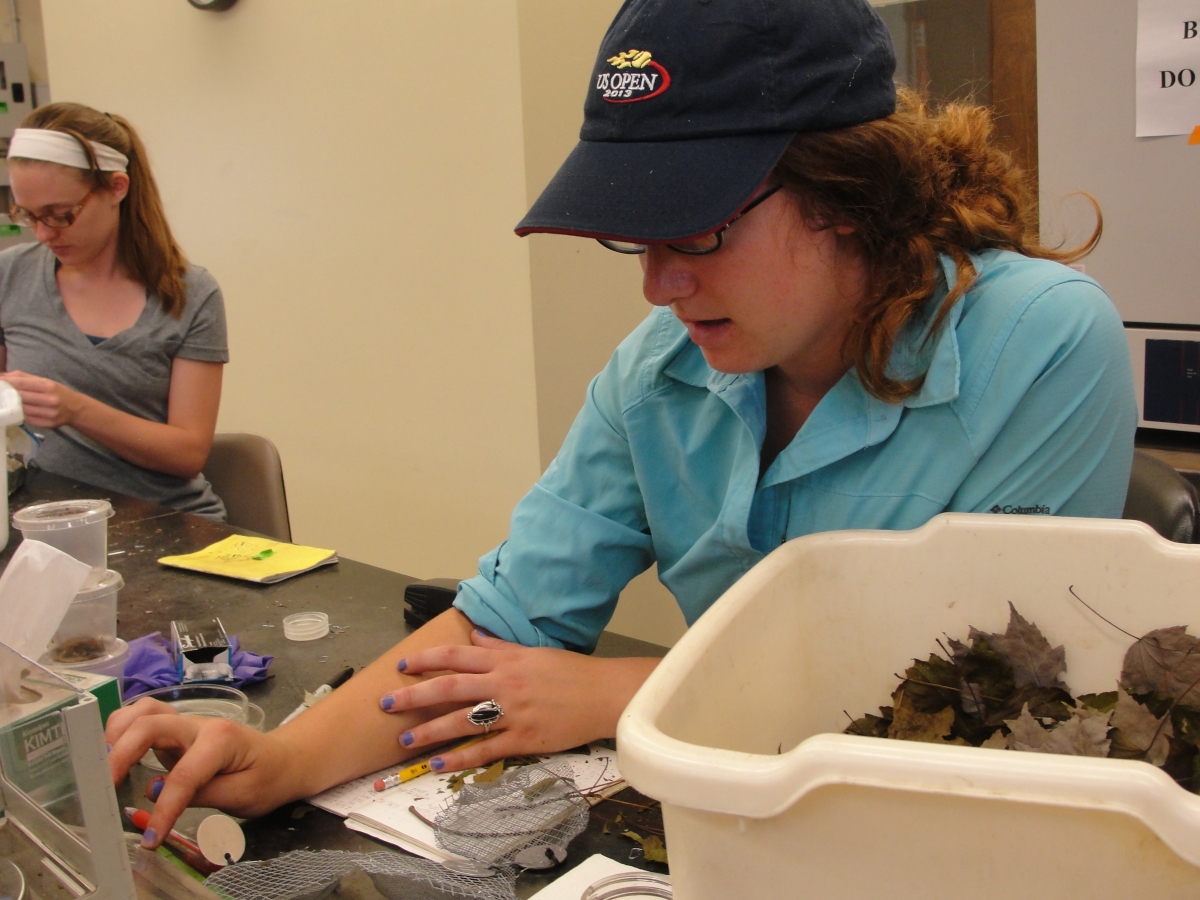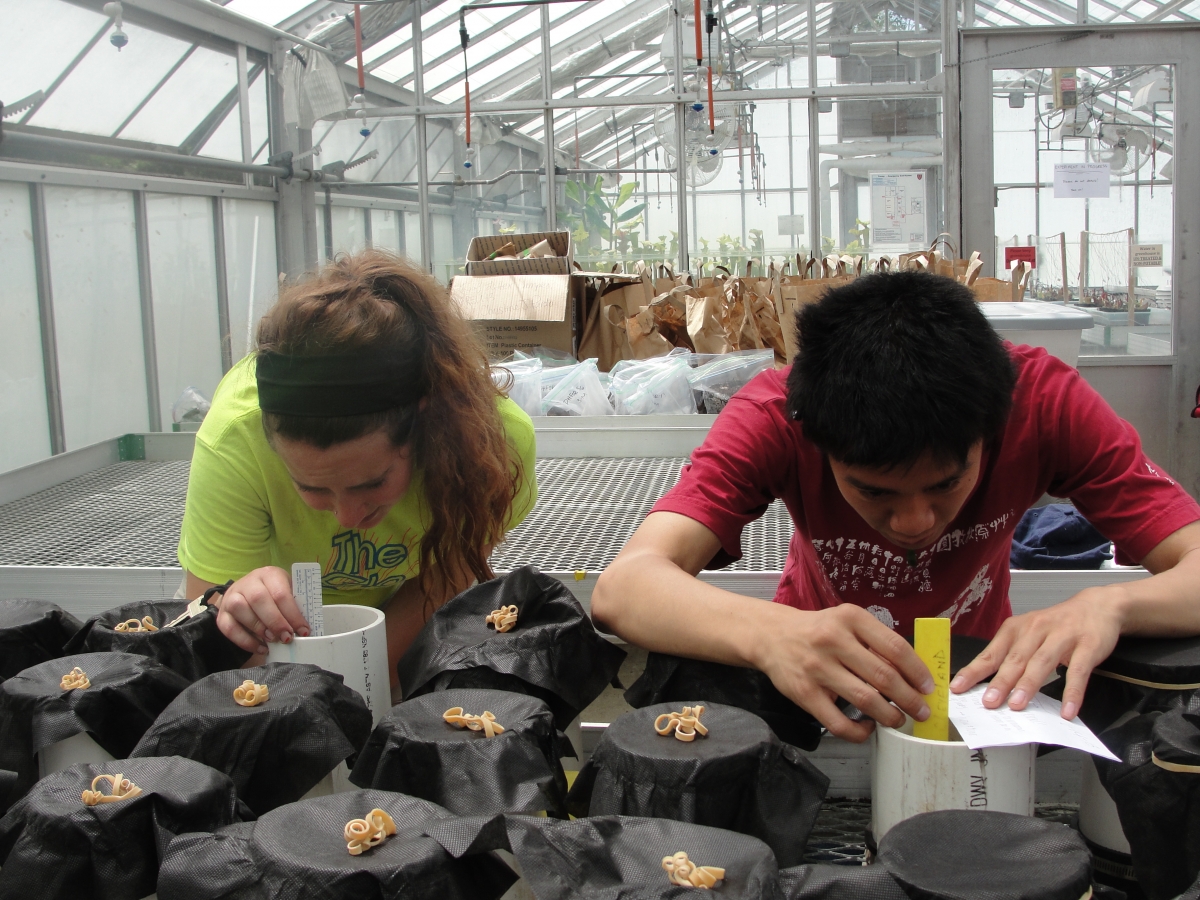You are here
The smell of the future
Justine handles the Li-COR. We walk up a forest road, all dust and shallow braids cut by decades of rain. Clouds are marshaling in the west, promising of another of these torrents that are so frequent and so sudden in these parts. The Li-COR stretching Justine's arms to the earth is what we might call hydrophobic, a piece of electronic equipment worth its weight in newborn babies.
We freeze on the path to examine undiscovered forest treasures: a shimmering garnet mica-schist, a gem-studded puffball, or a new butterfly that Justine drops everything to stalk – or at least blunder after with a net. These are a few of the benefits of living in hundred-year protected land. Who can blame us? After all, I grew up where the forests are slivers so thin they're all edges and crippled by the effects of urban sprawl.
 Finally, we reach our study plot, where a couple dozen open-top chambers squat on the hillside. There are two experiments here, or rather two experimental infrastructures. One is the Warm Plants project tossed into a moneyless purgatory when funding for the project was cut. The other is the Warm Ants project, which is what Justine and I have been working on for the past two months. We climb into the chambers, each of which centers on a red oak tree and has two concentric rings of pillow-like plastic tubing which blasts hot air raised a few °C above ambient temperature. The idea is to simulate global warming so that we can see what happens when the planet bakes. For Science.
Finally, we reach our study plot, where a couple dozen open-top chambers squat on the hillside. There are two experiments here, or rather two experimental infrastructures. One is the Warm Plants project tossed into a moneyless purgatory when funding for the project was cut. The other is the Warm Ants project, which is what Justine and I have been working on for the past two months. We climb into the chambers, each of which centers on a red oak tree and has two concentric rings of pillow-like plastic tubing which blasts hot air raised a few °C above ambient temperature. The idea is to simulate global warming so that we can see what happens when the planet bakes. For Science.
The Li-COR, our expensive, clumsy, and heavy piece of equipment aptly named "Dr. Swag" or "The Swag Machine," measures respiration – or the amount of carbon dioxide that any living thing is gassing out at any given time. We have ours rigged to measure the respiration of soil ecosystems. If you're asking why soil in particular: not only does soil cover an incredible amount of the earth's land mass, but it also is an enormous reservoir of carbon.
Imagine a large port, where ships are constantly coming in for repairs or modifications and then go back out to sea. Some of these ships come in, but never leave harbor. This is true for soil as well, carbon cycles in and out and occasionally the soil sequesters some if it away for good. In this sense, soil organisms are the dock workers that pull the ships in and send them back out, which they do by eating the carbon when it arrives in plant or corpse form and respiring it as CO2 gas. And we measure that process using Dr. Swag.
 As the planet warms up, these organisms might begin to work faster... or perhaps slower. This is the tricky part. We aren't sure. If they work slower, then perhaps the rate of global warming will also slow down because less carbon is entering the atmosphere through soil. If it's faster, then global warming will speed up. Will these organisms live or die? And what kind of impact will that have on the earth? These are things we want and need to know.
As the planet warms up, these organisms might begin to work faster... or perhaps slower. This is the tricky part. We aren't sure. If they work slower, then perhaps the rate of global warming will also slow down because less carbon is entering the atmosphere through soil. If it's faster, then global warming will speed up. Will these organisms live or die? And what kind of impact will that have on the earth? These are things we want and need to know.
In one of our plots, the warmest, an experiment once crawling with soil animals now looks like a wasted battlefield. We've had nearly one hundred percent mortality in these chambers. We don't know how much temperature will rise in the next century, but it's possible it will get as hot as this chamber is right now, about 5°C warmer than current temperatures. The scientist in me who must reason coldly and infer prudently shudders against the humanitarian in me, who says that the smell of global warming is the smell of the dead and dying. I know that this may not be the scene we see fifty years down the river, but I feel the future is rotting.

Quirky Q&A with Angus
Why does Goofy stand on two legs when Pluto remains on four?
While Goofy may be drawn and animated as Canis familiaris, he's also meant to represent humanity in this relationship. You may have noticed that Goofy, along with Donald Duck and Mickey Mouse, are all imbued with traits that most people would say separate humankind from the rest of nature – civilization, language, learning, art, clothing, even religion, and – of course – the upright and arrogant strut of our species. Pluto, the lowly and naked animal, has none of these things. (Yes, I went to a liberal arts college.)
Oh and also because Pluto's not a planet anymore. That's why.
The ultimate road trip car?
70s VW hippie van, complete with rainbow covered faux-leather seats and biodiesel converter. Can someone say "totally rad?"
When are you taking your next vacation and where are you going?
I actually have no idea when my next vacation might be. Like all other millennial college graduates, the unbearable pressure of finding a job is squeezing me into stone. (If anyone reading this is looking for a research assistant, I promise I am qualified.)

